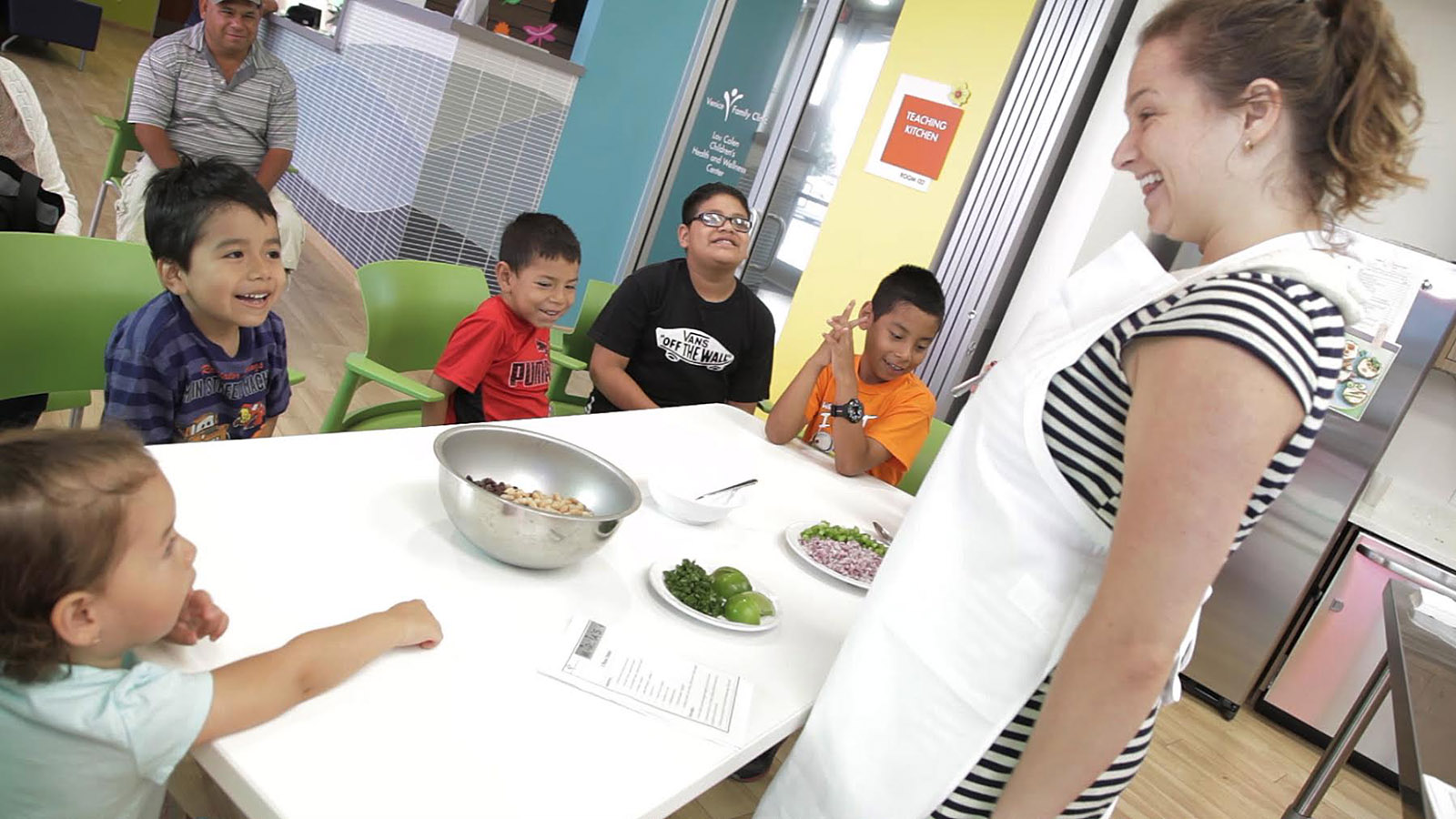UC, UCLA food justice programs focus on access, sustainability

Claudia Varney, a past student of UCLA’s Food Studies and Food Justice class, teaches children from low-income families how to throw together a simple, nutritious salad at the Venice Family Clinic. (Courtesy of John Vande Wege)
By Allison Ong
Oct. 25, 2015 12:57 p.m.
Samantha Chen poured creamy Greek yogurt, fresh strawberries and crunchy granola into a bowl, layering the ingredients to make a colorful, healthy parfait, and handed out spoons to the children surrounding her.
Chen, a fourth-year sociology student, taught her first cooking lesson for low-income families Monday at the Venice Family Clinic, as part of her Food Studies and Food Justice class at UCLA.
“We’re trying to show people that (healthy eating) is not out of reach,” said Chen, who prepares simple recipes for clinic patients on a weekly basis.
The course, funded by the University of California Global Food Initiative, is an opportunity for undergraduate students to learn about food sustainability, nutrition and the diverse cultural perceptions of food, said Kathy O’Byrne, director of the Center for Community Learning. Students who take the course also intern with a food-related community partner in Los Angeles.
“I wanted people to think about issues of access, equity and justice around food,” said O’Byrne, who first taught the course for the first time last summer. “We all need pretty basic things like air, water and food. We all need to care about this.”
The UC Global Food Initiative has funded research and community programs that address issues such as global nutrition and sustainability since its creation in July 2014. UC officials said they created the initiative to address crucial food sustainability issues such as climate change, population growth, third-world poverty and obesity, according to a UC press release.
At Kindred Spirits Care Farm, another community partner, UCLA students helped students from a continuation high school plant a pumpkin patch over the summer. Interns nurtured the farm’s resident alpacas, pigs, rabbits and chickens and nourished organic crops such as sweet potato, pole beans and cauliflower.
The farm is located at John R. Wooden High School in Los Angeles, in a low-income neighborhood, said Karen Snook, executive director of Kindred Spirits. She added that UCLA interns witness the nutritional and economic issues the high school students face, while the students benefit from working with positive role models.
Madeleine Gregory, a fourth-year Spanish and history student, said her experience at the farm inspired her to consider teaching as a career. As a summer intern, she taught students about genetically-modified organisms and the impact of global warming on agriculture.
Gregory also designed a high school food studies curriculum as part of her class’s final project. She said she emphasized lessons about nutrition labels, the meaning of the word “organic” and how to make well-informed dietary choices.
“I want to bring people closer to their food,” Gregory said. “I support making (food studies) part of the school curriculum because you can teach a lot about local issues high school students might not be exposed to.”
Since UC programs created the Global Food Initiative last year, food sustainability initiatives have taken root in new ways throughout the campus system with the introduction of food studies programs, Food Day events and increased attention to student nutritional health.
The Initiative also aims to focus on food security issues within the school system. In May, UC President Janet Napolitano granted $75,000 to each UC campus towards programs that support student nutrition and relief for those who may not be getting adequate access to food.
On Wednesday, UC officials announced annual fellowships for students pursuing research topics central to food studies and access. Third-year economics student Jesse Flores, one of seven UCLA recipients, will study community development through food and public health.
“Often in low-income areas, there’s not as much access to fresh fruits and veggies,” said Flores, who continues to volunteer at Kindred Spirits. “We’re trying to make food justice more relatable to the individuals in this community.”
Flores will work with English professor Joseph Nagy to design a Food Studies minor for undergraduate students. The UCLA Luskin School of Public Affairs will also introduce a graduate-level Food Studies certificate this winter.
O’Byrne said food justice is becoming an interdisciplinary issue everywhere. There are many inspirational politicians, activists and nonprofits exploring food justice and policy in the city of Los Angeles, she added.
“You can engage people from all undergraduate majors and faculty around the whole campus,” O’Byrne said. “This is a multilayered, inclusive conversation.”


